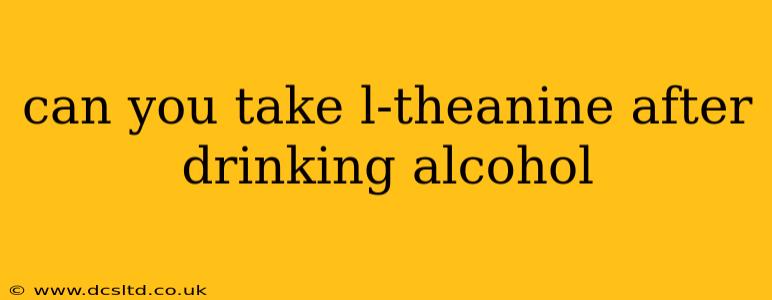Can You Take L-Theanine After Drinking Alcohol? Exploring the Interactions
The question of whether you can take L-theanine after drinking alcohol is a complex one, lacking definitive scientific consensus. While L-theanine is generally considered safe and well-tolerated, its interaction with alcohol warrants careful consideration. This article will explore the potential effects, benefits, and drawbacks of combining these two substances.
What is L-Theanine?
L-theanine is an amino acid found primarily in green tea. It's known for its ability to promote relaxation and improve focus without causing drowsiness. It achieves this by influencing brainwave activity, increasing alpha waves associated with a relaxed but alert state. This makes it a popular supplement for stress relief and cognitive enhancement.
What Happens When You Mix Alcohol and L-Theanine?
There's limited research specifically on the combined effects of alcohol and L-theanine. However, we can analyze their individual effects and infer potential interactions:
-
Alcohol's effects: Alcohol is a central nervous system depressant. It can impair judgment, coordination, and cognitive function. Excessive consumption can lead to nausea, vomiting, and even more serious health consequences.
-
L-theanine's effects: As mentioned, L-theanine promotes relaxation and focus. It's believed to work partly by modulating the effects of neurotransmitters like glutamate and GABA, which are also impacted by alcohol.
The potential interaction is subtle and unpredictable, depending on several factors, including:
- Amount of alcohol consumed: A few drinks will have a different effect than binge drinking.
- Dosage of L-theanine: Higher doses might interact more strongly with alcohol.
- Individual sensitivity: People react differently to both alcohol and L-theanine.
Some speculate that L-theanine might slightly mitigate some of the negative effects of alcohol, such as anxiety or difficulty sleeping. However, this is purely theoretical and not supported by robust clinical evidence. It's crucial not to rely on L-theanine to counteract the intoxicating effects of alcohol.
Will L-Theanine Help with a Hangover?
There's no scientific evidence to suggest that L-theanine helps alleviate hangover symptoms. Hangover symptoms are primarily caused by alcohol's dehydration effects and its metabolic byproducts. While L-theanine might promote relaxation, it won't address the underlying physiological causes of a hangover.
Does L-Theanine Increase or Decrease the Effects of Alcohol?
The effect of L-theanine on alcohol's impact is unclear and likely minimal. It's crucial to avoid assuming L-theanine will neutralize or reduce alcohol's effects. Alcohol remains the primary factor influencing your body and mind.
Is it Safe to Take L-Theanine After Drinking Alcohol?
Generally, taking a moderate dose of L-theanine after drinking a moderate amount of alcohol is likely safe for most adults. However, it's essential to be cautious. Avoid combining large doses of L-theanine with excessive alcohol consumption. If you experience any adverse effects, stop taking L-theanine and consult a healthcare professional.
When Should You Avoid Combining L-Theanine and Alcohol?
You should avoid combining L-theanine and alcohol if you:
- Have pre-existing liver conditions.
- Are taking other medications that interact with either alcohol or L-theanine.
- Are pregnant or breastfeeding.
- Have a history of alcohol abuse or addiction.
Disclaimer: This information is for educational purposes only and should not be considered medical advice. Always consult with a healthcare professional before starting any new supplement, especially if you have pre-existing health conditions or are taking other medications. This article does not endorse or encourage the consumption of alcohol. Responsible alcohol consumption is crucial for maintaining health and well-being.
